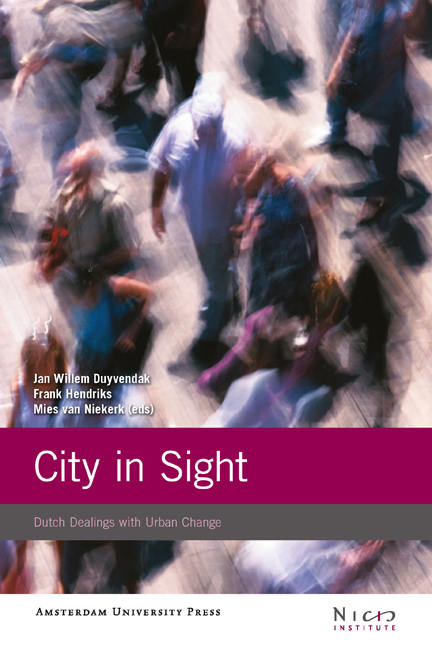Book contents
- Frontmatter
- Contents
- Acknowledgements
- Cities in Sight, Inside Cities: An Introduction 9
- Part I Urban Transformations and Local Settings
- Part II Urban Citizenship and Civic Life
- Part III Urban Governance and Professional Politics
- The Dutch Orange and the Big Apple: A Comparative Commentary
- References
- Notes on Contributors
- Index
5 - Local and Transnational Aspects of Citizenship Political Practices and Identifications of Middle-class Migrants in Rotterdam
Published online by Cambridge University Press: 19 January 2021
- Frontmatter
- Contents
- Acknowledgements
- Cities in Sight, Inside Cities: An Introduction 9
- Part I Urban Transformations and Local Settings
- Part II Urban Citizenship and Civic Life
- Part III Urban Governance and Professional Politics
- The Dutch Orange and the Big Apple: A Comparative Commentary
- References
- Notes on Contributors
- Index
Summary
Introduction
On 5 January 2009, Ahmed Aboutaleb was installed as mayor of Rotterdam – the first mayor of the Netherlands with dual Dutch-Moroccan nationality, and also the first Muslim mayor of a large West-European city. His appointment was controversial. Rotterdam is not only the city that has the largest proportion of immigrants of any Dutch city; it is also the place where Pim Fortuyn gained firm support for his populist right-wing party, Livable Rotterdam (cf. Burke 2009). At present, seven years after Fortuyn was murdered, Livable Rotterdam is the second largest party in the city council. When Aboutaleb was appointed as a mayor, the leader of Livable Rotterdam said this was unacceptable for his party. Aboutaleb’s two passports were seen as a sign of dual loyalty. After Aboutaleb’s installation, Livable Rotterdam therefore gave the new mayor a stamped envelope addressed to the king of Morocco, so he could send his Moroccan passport back to where it belonged.
The turmoil about Aboutaleb’s dual nationality is not an isolated case. In the Netherlands, multiple nationalities are increasingly considered to be an obstacle for immigrants’ full integration into Dutch society (De Hart 2005). This full integration is not measured in terms of socioeconomic performance of immigrants – many immigrants with dual nationality have, as Aboutaleb has, obtained middle-class status or higher – but in terms of immigrants’ feelings of belonging to the Netherlands. Moroccans and Turks with dual nationality are perceived as disloyal to their country of settlement and thus not fully integrated. Their transnational ties – with their homeland passport as the most explicit one – are viewed as an impediment for the formation of national and local identifications, and therefore as a danger for their functioning as active citizens in the Netherlands.
While the dangers of transnational political ties are predominantly discussed by politicians, this discourse can be found in Dutch social science literature on migration and citizenship as well. Some scholars have argued that transnationalization should be seen as an opportunity instead of as a threat (cf. Duyvendak et al. 2008), while others maintain homeland ties impair local and national feelings of belonging (cf. Van den Brink 2006: 292; Scheffer 2007: 285). Both views, however, are often based on conviction rather than empirical evidence. Research has shown that dual nationality and transnational involvement do not form an obstacle to socioeconomic integration (cf. Dagevos 2008; Snel et al. 2006).
- Type
- Chapter
- Information
- City in SightDutch Dealings with Urban Change, pp. 103 - 120Publisher: Amsterdam University PressPrint publication year: 2009
- 1
- Cited by



